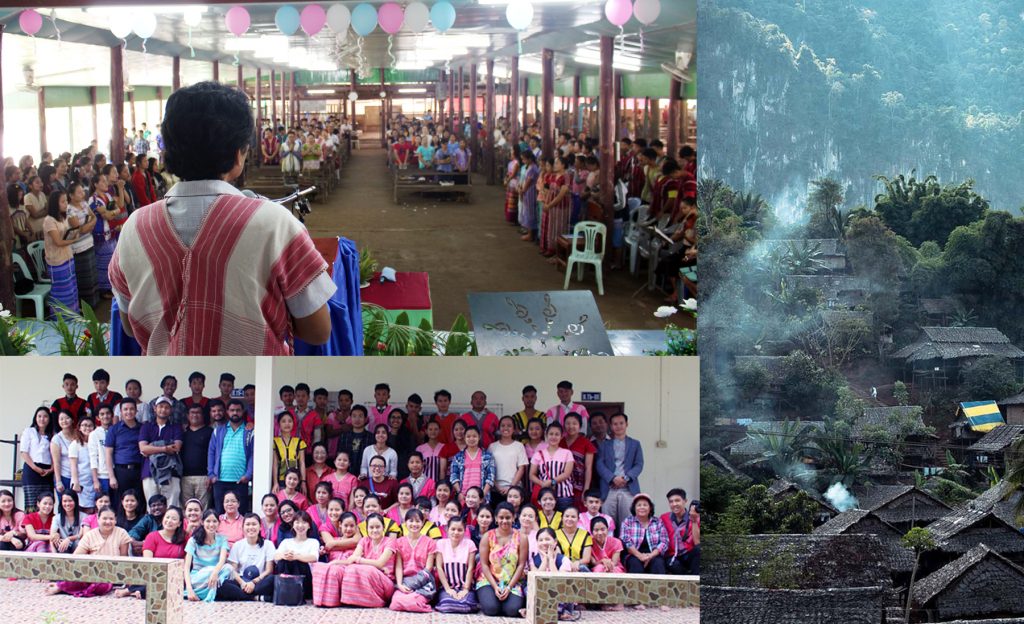Asian Ecumenical Institute participants experience the plight of displaced people in refugee camp
 Asian Ecumenical Institute Participants' Visit to Refugee Camp on Thailand-Myanmar Border
Asian Ecumenical Institute Participants' Visit to Refugee Camp on Thailand-Myanmar Border
An experience of living together with refugees inside a camp on the Thailand- Myanmar border helped the participants of the Asian Ecumenical Institute (AEI) to learn more about the ground reality of the refugees who experience the disgraceful humanitarian calamity of suffering and displacement.
In an exposure programme arranged as part of the outdoor learning process of the AEI-2018, the participants spent three days at the Mae La refugee camp in Mae Sot from 4 to 6 August 2018. The Mae La camp is one of the seven Burmese refugee camps on the Thailand-Myanmar border.
Due to civil war and conflict with the military, the displaced people of Myanmar sought refuge in Thailand and have been living in refugee camps since 1985. The Karen Refugee Committee (KRC) has been instrumental in setting up shelters and catering to the basic needs of the refugees. The services provided to the refugees include camp management, health, primary education, livelihood and social service programmes.
Approximately 50,000 people live in the Mae La refugee camp but more people continue to arrive from Myanmar regularly owing to the volatile situations in their provinces in the country.
The residents of the refugee camp who welcomed the AEI participants shared their experiences in the conflict situation and the circumstances that led them to flee. They also talked about their situation inside the refugee camps.
Dr. Saw Alwyn, Dean of the Kaw Thoo Lai Karen Baptist Bible School in the refugee camp said, “It is painful to live as refugees…and it is not easy to live in a camp for more than four decades, without any official refugee status even. However, we have hope in God and believe that God has a plan for our young people.”
Dr. Alwyn further added, “We want to be free, we want to go home”. He urged the visiting AEI participants from various countries to go back to their home countries with the voices of the refugees and take their message to the international community so that they may know the needs of the refugees; their pain, suffering, and desire for freedom.
Dr. Alwyn told the AEI participants, “The most important facet we look for is safety”. He added, “All of us have a dream that one day we will go back and with the support of the members of churches and organisations like CCA and others we can have our lives back. However, our enemies will always be there and so, pray for and with us”.
The AEI participants joined the residents of the camp in Sunday worship service inside the camp.
The CCA staff team who coordinated the exposure visit to the camp facilitated a Bible Study for the youths of the camp. Rev. Dr. Chuleepran, who led the Bible study on Psalms 61, told the group that they should not lose trust and faith in God despite many hardships.
Rev. Grace Moon in a sermon delivered at the worship service said “The verse ‘I am the way, the truth and the light’ would be the most profound faith confession that would sustain us and help us to never lose hope, no matter how heavy our cross is; God is with us and He will show us the way.”
The AEI participants attended the Sunday evening youth service in the camp and participated in singing of hymns together with the young people in the camp.
“It was a human adventure where I learnt to go deep into the sense of the word “empathy” and be compassionate about what people of my generation are going through in this part of the world” said Julie Aurelie Babet, an AEI participant from Mauritius.
Allan Franco Jr from the Philippines said, “The experience was fulfilling and it was touching to see the people’s undying hopes that one day they would return to the land of their ancestors, liberated from the political and social chains they are bound by now.”
Miriam Bumrungkarn from Thailand said, “I was surprised to find the people leading a disciplined life inside the camp, despite their struggle and suffering. They created a life for themselves here away from their home, land, culture and people by drawing strength from their faith in God.”
“Seeing the misery and hardship imposed on the people at this camp, through no fault of their own has pained me deeply. It has been a moving experience” said Rev. Meragalage Anil Wickramasinghe from Sri Lanka.
Thousands of refugees from Myanmar have lived confined to the camps in Thailand for more than 40 years. Although refugee camps are hardly natural places to live in, thousands have been born in the camps and have never left. For many young refugees, these refugee camps on the Thailand-Myanmar border are the only ‘home’ they have known.










